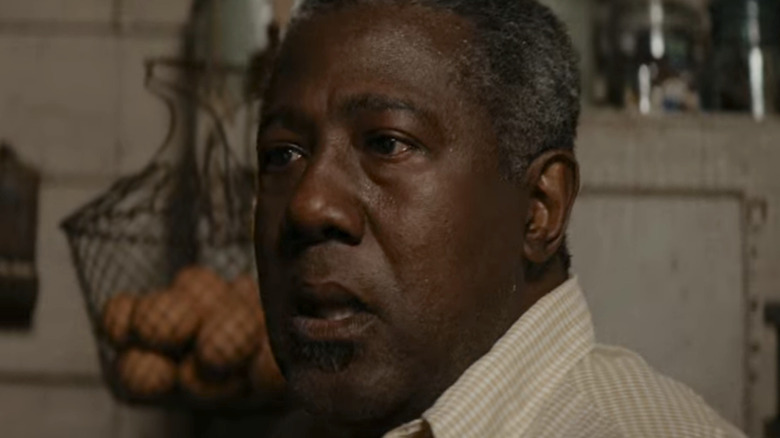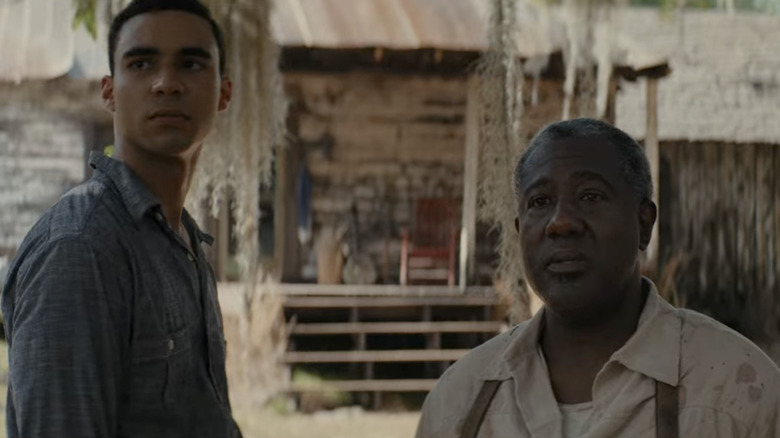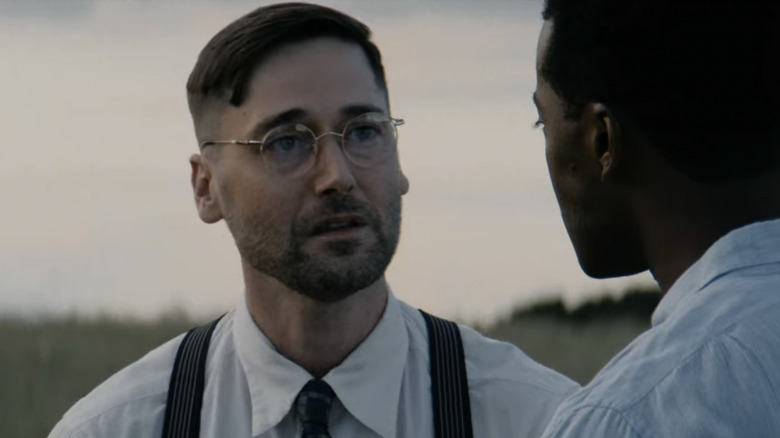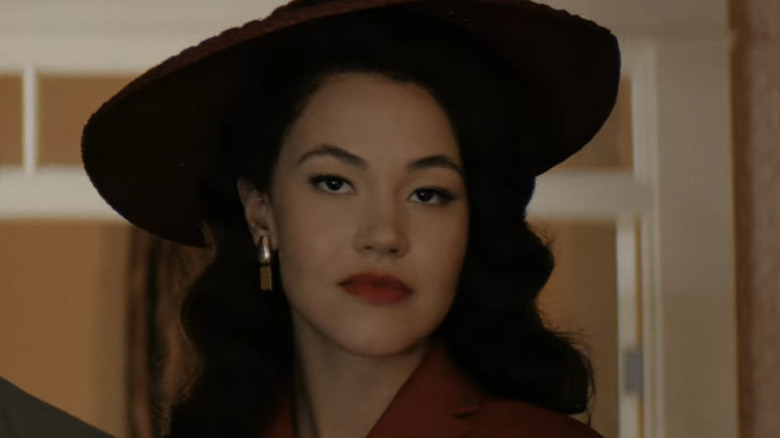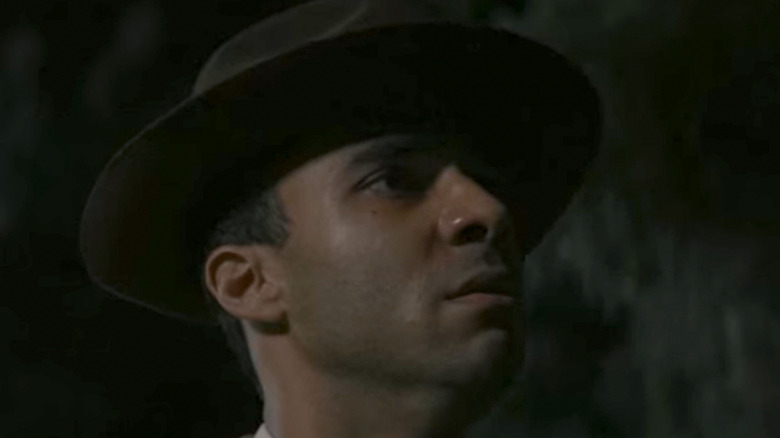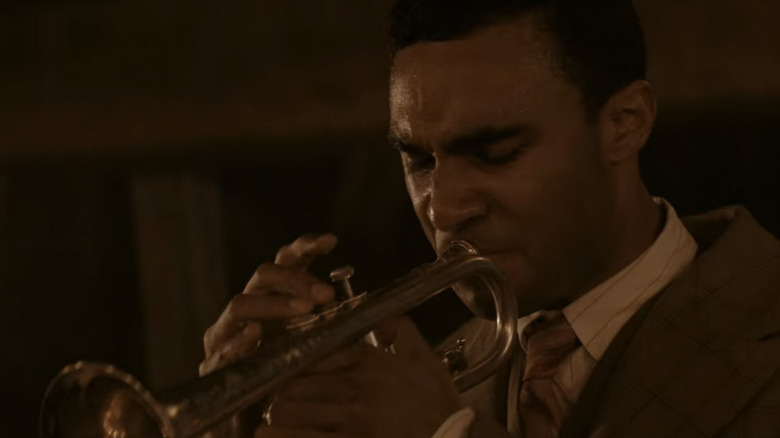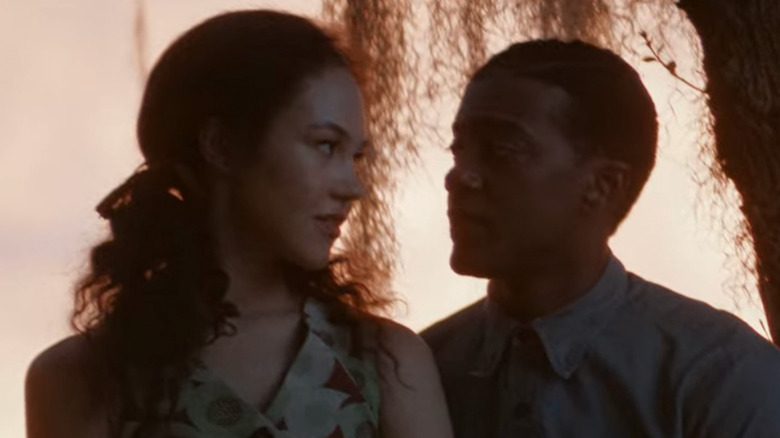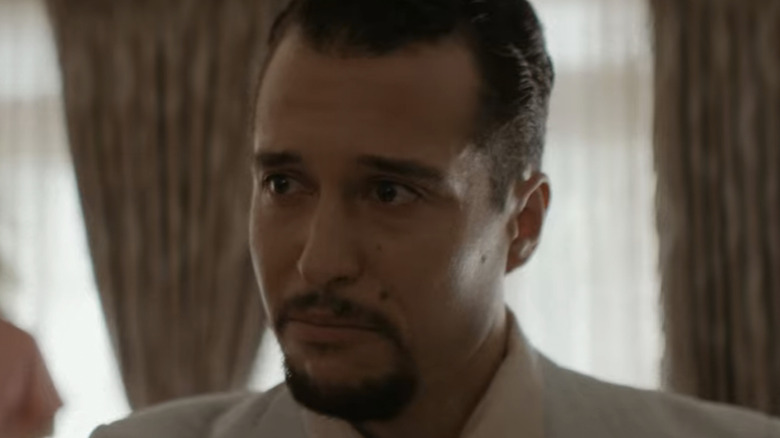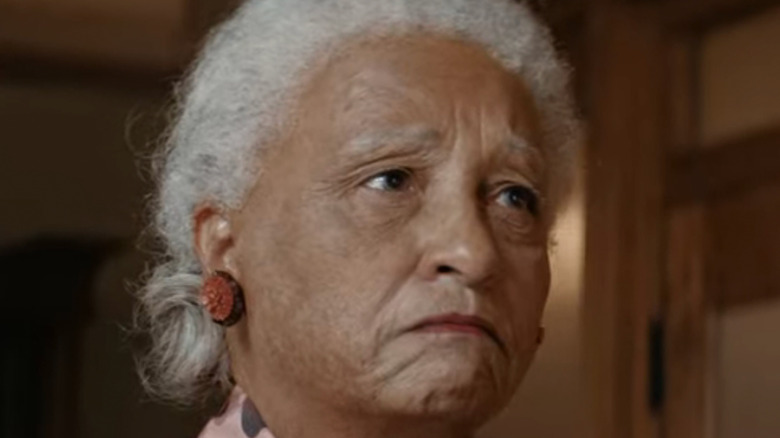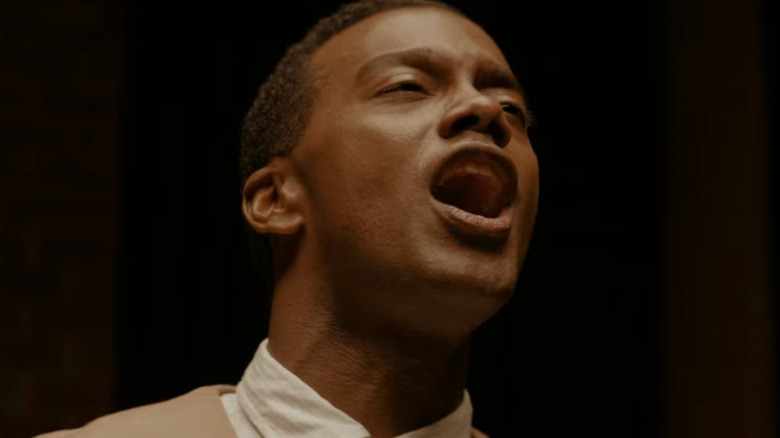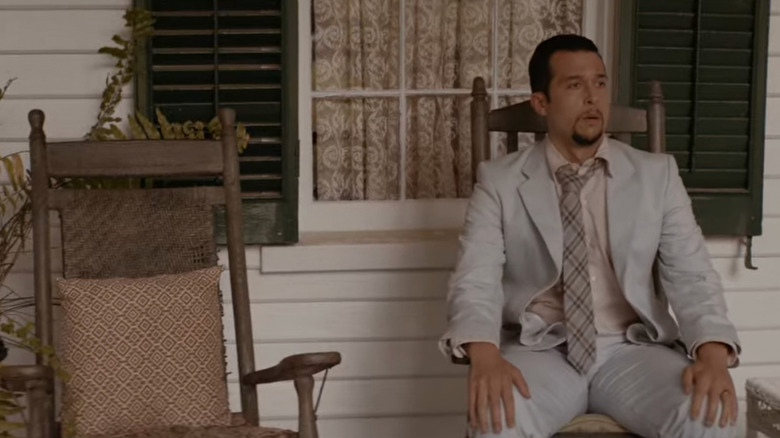The Ending Of A Jazzman's Blues Explained
For those last few holdouts who still think of Tyler Perry as nothing more than the man who wears the "Madea" suit, his film "A Jazzman's Blues" will almost certainly open your eyes.
The Netflix original has struck a poignant, resonant chord with critics and audience members, due to its masterful portrayal of both the beauty and brutality inherent in the Black American experience. Perry writes, directs, and produces the film with a deft hand, turning what could have been a boilerplate period drama into a sweeping family saga that unravels in surprisingly effective ways, revealing the insidiousness of institutionalized racism in the south.
The story of "A Jazzman's Blues" spans fifty years, from 1937 to 1987, but by the time it ends, feels as if it had covered hundreds of years worth of sentimentality and suffering. The story of jazz singer Bayou Boyd (Joshua Boone) takes him to the highest peaks and lowest valleys possible for a Black man of his era, and leaves a lot worth discussing in its wake. There is a lot to unpack in this tragic epic; here is the (spoiler-heavy) ending of "A Jazzman's Blues," explained.
Buster and his stuff
For all of its characters' triumphant moments and surprising successes, "A Jazzman's Blues" is ultimately a tragedy, a chronicle of one man's lifelong suffering and persecution. As grievous as the film's ending — Bayou's death by hanging — is, there are a number of reasons why Bayou's life was doomed from the start. Likely, the first chronologically comes before Bayou is even born: the cruelty and addiction of Bayou's father, Buster.
From the very first scene in "A Jazzman's Blues," Perry pulls the rug out from under the viewer, displaying Buster's mean streak. During a lively community barbecue and singalong, Buster invites Bayou to join in on the music, forcing him to play the trumpet (which he doesn't know how to play) instead of his natural inclination to sing. The point is to humiliate Bayou and heap praise upon his other son, Willie Earl — a wiz at the instrument.
This favoritism has a couple of major explanations; one of them is Buster's addiction to hard drugs, heavily suggested to be heroin. When Buster walks out on Hattie Mae and their boys, he is clearly intoxicated, and when Willie Earl becomes irreversibly addicted to the substance, the boy even mumbles that he learned from Buster.
My daddy ain't your daddy
As if Buster and Willie Earl needed another reason (besides their shared addiction) to abuse Hattie Mae and Bayou, "Blues" slowly reveals one: Willie Earl and Bayou have different fathers.
The first clue comes when Buster abandons his family in Georgia for a life in Chicago. Obviously drunk and/or high, Buster chooses to spew one last stream of abuse wherever it will land, including on Bayou. "You ain't sh**," Buster says to Bayou. "Just like your black a** daddy." Though the line could be read as Buster putting himself down (out of self-pity) at the same time he puts down Bayou, the truth is more complicated.
In the midst of his deep, dark, drug-induced stupor, Willie Earl follows in Bucket's footsteps, needlessly hurling abuse at Bayou. Among other meaningful attacks, he tells Bayou that "you a half-breed, all right? My daddy ain't your daddy."
From then on, the larger picture of the family's dynamics starts to become clear. Since Buster is Willie Earl's father, and Willie Earl is older than Bayou, that means that Hattie Mae must have cheated on Buster and conceived Bayou with another man. This of course, has bred resentment in Buster and in turn, Willie Earl, but it becomes harder to blame Hattie Mae once the truth of Buster's abuse and addiction come to light.
Ira's journey
Of the many well-developed, compelling side characters in "A Jazzman's Blues," it is Bayou and Willie Earl's manager Ira (Ryan Eggold) that stands out. Though he seems from his first few appearances to be merely a stooge in the employ of Willie Earl, every bit as unfriendly and every bit as hooked on narcotics, Ira gradually proves himself to be one of the film's most important characters, and one of the few who genuinely cares for Bayou.
Though Ira begins by playing his cards close to his chest, he eventually opens up completely to Bayou — just when it is most needed. When Bayou fears that his escape to Chicago will leave his mother in jeopardy with the remaining mob in Georgia, Ira takes a long while to explain to Bayou exactly why he should continue on, why perseverance is an admirable goal.
He tells Bayou of his experiences as a Jewish person in the Holocaust, and they are as dark as expected. His possessions and home were stolen, he was forcefully brought to a concentration camp, witnessed his wife and child murdered before his eyes, and somehow still endured. Though he never mentions how he obtained his freedom, he hints at a role akin to Oskar Schindler by saying that eventually, "I helped many people." Finally, he reveals the parallel to Bayou, telling him "sometimes you have to just go on, so that you can come back to help."
Bucket or Leanne?
The obvious protagonist of "A Jazzman's Blues" is Bayou. It's his story, from when we first meet him in 1937 all the way until 1987, despite his death some 40 years ago. We watch him grow from shy, bumbling teen to explosive jazz sensation and finally to tragic martyr — as satisfying (from a storytelling standpoint) an arc as any. But if another character in the movie vies for the narrative spotlight it's Bucket, aka Leanne (Solea Pfeiffer), whose journey is no less radical and only slightly less tragic.
She was born a Black woman, orphaned when "her mama dumped her here like an empty bucket," gaining her nickname. But at some point after her romance with Bayou, she learned that her skin was pale enough for her to pass as a white woman. Whether her choice or that of her controlling mother, Bucket decided to live her life as a white woman, dropping her nickname in favor of her birth name, Leanne.
Despite all the advantages that come with being white, Leanne's choice (or perhaps, an offer she couldn't refuse) to pass brings her an almost inhuman amount of grief. From the first years of adulthood until her dying day (or at least, until 1987), Leanne is pushed around by her mother and controlling husband, and sadly, the few instances in which she is able to make any decisions of her own — all of them efforts to be with Bayou — ultimately lead to Bayou's untimely death.
Willie Earl's betrayal
In contrast to the long, profound arcs characters like Bayou and Leanne go through over the course of "A Jazzman's Blues," a handful of its characters never change at all — and that's a good thing. From start to finish, Willie Earl proves himself to be a petty, self-serving coward, and it's the consistency he provides that allows the viewer to see just how astonishing Bayou's journey to fame is — and how inevitable his downfall is, as well.
After everything Bayou does to help Willie Earl — including carrying him to fame, trying to get him clean and sober, and even ignoring his decades of verbal abuse — Willie Earl never warms up to Bayou. Just as they are about to leave Chicago for one last trip to Georgia, Willie Earl tells Bayou that the Georgia police are "gonna kill you ... how I'm gonna be glad when they do, too." What he says is no guess — he makes certain it comes true. When they arrive back in Georgia, Willie Earl finds the local sheriff and rats out Bayou's location, fully aware he is signing his half-brother's death sentence. The sheriff and his mob capture and execute Bayou — and upon viewing the scene, Willie Earl barely reacts.
Bayou dead
The centerpiece of the ending to "A Jazzman's Blues" is the death of Bayou at the hands of Sheriff Jackson (Brad Benedict) and his mob of bloodthirsty bigots, all for the alleged — and completely false — crime of whistling at a white woman (who just so happens to be Black by birth). The events that led to such a shocking, unjust murder are numerous and worth exploring.
If Bayou commits any crime, it's continuing to act on his feelings for Leanne, knowing she is in a relationship. And though normally, this wouldn't be an offense that would prompt a murder, Leanne's beau is John Clayton (Brent Antonello), an aspiring politician and brother of Sheriff Jackson. The issue is further muddied by Leanne's dual identity. To Bayou, she's just the Black girl named Bucket he dated as a teen, but to Clayton and Jackson, she's a blue-blood southern belle named Leanne — making her union with Bayou interracial, and therefore worthy of the brothers' wrath.
Even accounting for Leanne and Bayou's affair and the brothers' misplaced hatred, Bayou might have survived if not for Willie Earl's betrayal. That betrayal only bubbled its way to Willie Earl's surface thanks to his unchecked addiction — a gift from Buster — and longtime jealousy of Bayou's smash success.
Love over all
A major theme in "Blues" that cements itself in the movie's final minutes is the war between the constant, unmovable features of life and the wild changes we all go through despite those constants. One great example is the difference between the phenomenal personal growth and professional success of Bayou when compared to the perpetual egotism and entitlement of Willie Earl. Another example of this theme, and one at the very heart of the movie, is the contrast between how significantly Bayou and Leanne both change over the course of their lives and the uninterrupted, eternal love they share for each other — all the way until their deaths.
Every time they're given any choice, Bayou and Leanne choose their paths based solely on their love. When both are poor Georgia children, Bayou incurs the wrath of Bucket's abusive grandfather — in the name of love. When the two are reunited for the first time after Bucket has become Leanne and become engaged, they run afoul of Sheriff Jackson's mob — in the name of love. Their final act of love is meeting in secret in order to run away together — an act so steeped in deathless love that any and all consequences are ignored. Their constant, irresistible love stays firm through all of their ups and downs, and even through one of their deaths.
Jonathan is Bayou's son
There is one major twist in "A Jazzman's Blues" that dwarfs all others: seemingly white (and most definitely bigoted) politician Johnathan Dupree is actually the secret love child of Leanne and Bayou, and is therefore himself a Black man.
When the movie opens with an elderly Hattie Mae giving Jonathan a stack of letters in 1987, neither the audience nor Jonathan himself has any reason to suspect it has anything to do with his heritage. It's worth noting, however, that Jonathan would have noticed his mother's name as the recipient of some or all of the letters (as he would only have recognized the name Leanne, not Bucket). As Jonathan reads the copious correspondence, he slowly learns the history of Bayou's family and even more slowly learns that Bucket is his mother Leanne, Leanne had an affair with Bayou, and that affair produced a son — a son with light enough skin that he could be raised as white.
The realization hits Jonathan hard and leaves his entire worldview in question. It also re-contextualizes a huge chunk of the movie's message. The arbitrary, absurd racism that dominated so many characters' lives becomes even more nonsensical when viewers learn that someone could be born one color, raised as another, and never know the difference.
Mr. White Man
A lot of great films use bookends — matching shots or scenes at the movie's beginning and end — to highlight their journeys and wrap their stories up in neat little bows (think "Saving Private Ryan"). Perry's "Blues" employs the technique, but in a far subtler way than you might expect.
The movie's first scene takes place in 1987, showing an elderly Hattie Mae watching career politician Jonathan on television. After he delivers a prejudicial rant using welfare and Affirmative Action as ammunition, Hattie Mae shuts the TV off with a "I had just about enough of you, Mr. White Man." Her comment is understandable and works at face value, but upon seeing the ending of "A Jazzman's Blues," it takes on an entirely new significance.
When Hattie Mae calls Jonathan "Mr. White Man," she does so sarcastically, knowing Jonathan's hidden heritage. Far from the White southern pureblood he thinks himself to be, Jonathan was actually born to two Black parents — Bayou and Leanne — making him Black himself, and making Mattie Mae his paternal grandmother. What Hattie truly meant was more akin to "Okay, time to reveal to you the truth, and in doing so, hopefully fix your slanted view on your fellow man."
Paper Airplanes
The very last scene in "A Jazzman's Blues" sees Jonathan confronting his elderly mother, Leanne, with the stack of letters that prove her relationship with Bayou, confirming their Blackness. When her nurse attendant wheels her in for the conversation, she grips an old record, one she apparently brings with her everywhere and plays on a constant loop. On top of the record are paper airplanes, the product of a persistent, absent obsession of hers. Below the airplanes, you can just make out the record's name: appropriately, it's "Paper Airplanes." The record is, of course, the hit single that Bayou released as Bayou Boyd, at the peak of his fame, and it carries with it a ton of deeper implications.
On the one hand, Leanne's fixation is a clear expression of her lifelong remorse at inadvertently causing Bayou's death. On the other hand, it (alongside her behavior) suggests that she has begun losing her mental faculties with age, and as fragments of her memories are shed, the core piece of her that outlasts everything else is a love for Bayou. Pulling back further, perhaps the meaning behind the record is to demonstrate the rich, sometimes tragic history behind much of Black culture in America — even the parts of it that seem the most cheerful and rosy.
What's next
For a few of the main characters in "A Jazzman's Blues," huge changes are almost certainly in store. For others, sadly, any meaningful change is unlikely.
As the principle characters from 1937 and 1947 (like Leanne) approach the final chapter of their lives, they are unlikely to affect any real change or see any further resolution to their problems. It is likely that Leanne will take the same regrets for Bayou's death to the grave that she carried for all those decades. Hattie Mae, on the other hand, was able to facilitate some tremendous potential change by revealing to Jonathan his Black heritage.
That revelation also makes Jonathan the biggest question mark when it comes to change. Will his newfound origins reshape his identity and help him work through some of his bigotry? Or will social pressure lead to an inertia that keeps Jonathan on the same hate-filled path?
As far as writer/director/producer Perry goes, whatever comes next is certain to be interesting. In the eyes of many critics, Perry's career — and especially "A Jazzman's Blues" — has established him a leading Black director in telling genuine, profound Black stories. Though a sequel to "A Jazzman's Blues" feels extremely unlikely, it is a safe bet that Perry will create more films with such depth and relevance.

